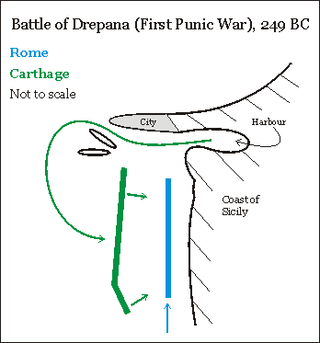Related Research Articles

This article concerns the period 49 BC – 40 BC.

This article concerns the 200 BC decade, that lasted from 209 BC to 200 BC.
During the 290s BC, Hellenistic civilization begins its emergence throughout the successor states of the former Argead Macedonian Empire of Alexander the Great, resulting in the diffusion of Greek culture throughout the Levant and advances in science, mathematics, philosophy, etc. Meanwhile, the Roman Republic is embroiled in war against the Samnites, the Mauryan Empire continues to thrive in Ancient India, and the Kingdom of Qin in Ancient China, the one which in the future will conquer its adversaries and unite China, begins to emerge as a significant power during the Warring States period.
This article concerns the period 279 BC – 270 BC.
This article concerns the period 259 BC – 250 BC.
This article concerns the period 249 BC – 240 BC.
This article concerns the period 219 BC – 210 BC.
Year 208 BC was a year of the pre-Julian Roman calendar. At the time it was known as the Year of the Consulship of Marcellus and Crispinus. The denomination 208 BC for this year has been used since the early medieval period, when the Anno Domini calendar era became the prevalent method in Europe for naming years.
Year 209 BC was a year of the pre-Julian Roman calendar. At the time it was known as the Year of the Consulship of Verrucosus and Flaccus. The denomination 209 BC for this year has been used since the early medieval period, when the Anno Domini calendar era became the prevalent method in Europe for naming years.
Year 210 BC was a year of the pre-Julian Roman calendar. At the time it was known as the Year of the Consulship of Marcellus and Laevinus. The denomination 210 BC for this year has been used since the early medieval period, when the Anno Domini calendar era became the prevalent method in Europe for naming years.
Year 247 BC was a year of the pre-Julian Roman calendar. At the time it was known as the Year of the Consulship of Metellus and Buteo. The denomination 247 BC for this year has been used since the early medieval period, when the Anno Domini calendar era became the prevalent method in Europe for naming years.

Year 279 BC was a year of the pre-Julian Roman calendar. At the time it was known as the Year of the Consulship of Publius Sulpicius Saverrio and Publius Decius Mus. The denomination 279 BC for this year has been used since the early medieval period, when the Anno Domini calendar era became the prevalent method in Europe for many years.
Duke Wen of Eastern Zhou, personal name Jī Jié, reigned as King Hui of Zhou over the remaining rump state of the Zhou dynasty from 255 BC to 249 BC, when he was captured and executed by the army of Qin. Wen was the last member of the Zhou dynasty who claimed the throne of China, though he was never recognized as king outside his own small domain at Chengzhou. Forced to spend his entire reign fighting against the state of Qin, Wen's death meant the final end of the Zhou dynasty.

Adherbal, also known as Atarbas, was the admiral of the Carthaginian fleet which battled the Romans for domination of the Mediterranean Sea during the First Punic War. Polybius identified Adherbal during the Battle of Drepana as the Carthaginian commander-in-chief. He led the Carthaginian fleet to Drepana in Sicily and inflicted a crushing defeat on the Roman consul P. Claudius Pulcher during the naval battle in 249 BC.
Publius Claudius Pulcher was a Roman politician.
Appius Claudius Pulcher was a Roman general and politician of the 3rd century BC, active in the Second Punic War.
Carthalo was an officer in Hannibal's army during the Second Punic War.
Lucius Junius Pullus was a politician and general of the Roman Republic. He was consul in 249 BCE together with Publius Claudius Pulcher. He and his consular coleague fought in the ongoing First Punic War.
Marcus Claudius Glicia or Glycias was a subordinate of the consul Publius Claudius Pulcher who briefly served as dictator in 249 BC.
The naval Battle of Phintias took place in 249 BC during the First Punic War near modern Licata, southern Sicily between the fleets of Carthage under Carthalo and the Roman Republic under Lucius Junius Pullus. The Carthaginian fleet had intercepted the Roman Fleet off Phintias, and had forced it to seek shelter. Carthalo, who heeded the warning of his pilots about impending storms, retired to the east to avoid the coming weather. The Roman fleet did not take any precautions and subsequently was destroyed with the loss of all but two ships. The Carthaginians exploited their victory by raiding the coasts of Roman Italy until 243 BC. The Romans did not mount a major naval effort until 242 BC.
References
- 1 2 Schinz (1996), p. 80.
- Works cited